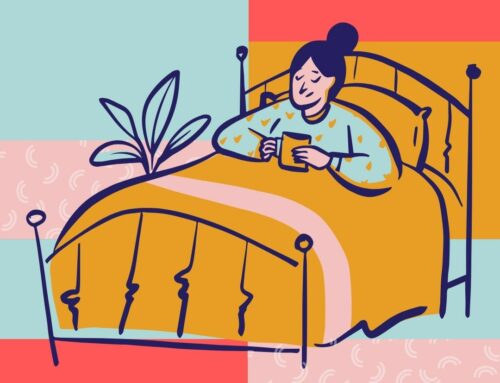
Photo by Jen Theodore on Unsplash
The first book that I read and made me realise I had the beginning stages of perimenopause is called “Period Repair Manual” by Lara Briden. I was experiencing waking through the night, which was crippling and was becoming a bit of a problem. One of the chapters in this book – “What to expect in your forties” – helped explain the why. This blog is my research into why perimenopause can cause insomnia.
During perimenopause your progesterone gradually declines. Progesterone is a calming hormone. When we have less of it, it makes us less able to cope with stress. And with the 40s being a busy time for a lot of women – children, careers and aging parents – adding declining progesterone makes stress harder to deal with. Women, in this period, are therefore likely to suffer from insomnia (as well as anxiety and depression). Luckily, Lara Briden assures this is temporary and mood will be better after menopause.
Some women will also suffer insomnia because they suffer from hot flashes that wake them (which I am not dealing with directly in this blog).
Some of the tips to help with insomnia are to look after yourself by taking time out for yourself. Massage, yoga, etc can all help. Reduce your intake of alcohol. Alcohol lowers progesterone and therefore, the calming effect potentially makes sleeplessness worse. Also in her book Lara recommends magnesium and vitamin B6 among others.
I personally have taken magnesium and vitamin B6 (consult the book for what to take) that appear to have stopped the constant nights lying awake that made functioning well rather hard. I still, sometimes, wake through the night but I haven’t gone back to that zombie feeling. It is also possible to make an appointment with a specialised gynecologist who you can talk through your symptoms and discuss a plan which could include hormone therapy . Maybe hormone therapy is something that will work for you. It seems it is very individualised, can take a few attempts to work for you and works better for some than for others.
If you are in the UK, there was recently a programme called “sex, myths and the menopause” where they discussed how a gynacologist can help you with hormone therapy. If you can access it, it is worth a watch.
If you are a woman in your 40s and suffering from insomnia it might be worth looking to see if you have other perimenopausal symptoms. If so, there may be something you can do about it.
Author: Lorna Wilson
Like what you see? Then send me a message or e-mail. We can meet up for a chat and find out how I can help you improve your training and help reduce injury risk.
06 460 377 74 / lorna@wilsonsworkouts.nl





[…] Perimenopause and insomnia […]